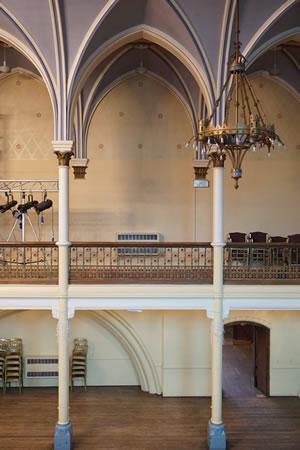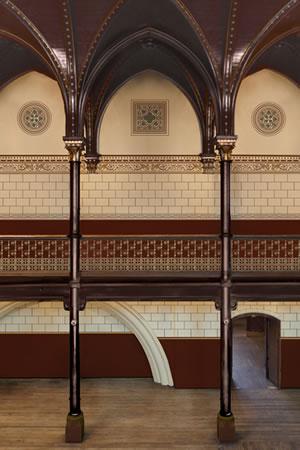Dover’s 800-year old Maison Dieu, also known as Dover Town Hall, has been upgraded from a Grade II* to a Grade I listing by the Department for Culture, Media and Sport (DCMS). New research has revealed that the building is far more important than anyone suspected due largely to hidden decorative work by the flamboyant Victorian architect William Burges (1827-1881), the full extent of which has only recently been discovered.
Originally a medieval hospital offering shelter to pilgrims heading to Canterbury Cathedral, the Maison Dieu also served as a naval victualling yard, a Victorian court room and gaol, and a seat of government of the Dover Corporation. The building was extensively remodelled in the late nineteenth century by William Burges of Cardiff Castle fame. The result is the creation of one of the most important interiors of the 19th Century. The Maison Dieu is also designated as a Scheduled Monument.
The upgrading of the Maison Dieu to a Grade I listing comes after two years of research into its history and the discovery of a much more extensive interior scheme by Burges than originally thought. Currently much of the decorative scheme is hidden under layers of paint. Experts have undertaken testing to establish the extent of the decoration and produced images to show the original scheme, which if a recent Heritage Lottery Fund (HLF) bid is successful, will be reinstated.
The Maison Dieu is owned and maintained by Dover District Council, which has submitted a bid to the HLF for a major restoration of the building. Reawakening Burges’ gothic fantasy, the plans will create a cultural venue that is fully open to the public and visitors for the first time in the building’s history. Its revival will contribute to a wider programme of regeneration in the UK’s gateway town, and complement Dover’s many heritage assets to build a stronger visitor economy.
Heritage Minister, Tracey Crouch, said: "Dover Town Hall is an important part of the town's vibrant history, and this research has revealed an intriguing new side to it. I’m delighted that we have upgraded Dover Town Hall to a Grade I listing, in recognition of its fine architectural details and historical significance."
Posy Metz, Listing Advisor, Historic England, said: "Dover is not short of important heritage, but the Town Hall, which incorporates the remains of the Maison Dieu, is one of its gems. The building fully deserves being upgraded to Grade I, the highest level of listed buildings. It was restored in the mid-19th century and substantially extended in the late 19th century by William Burges, a Gothic Revival architect of considerable renown. Burges’ decorative interior paint scheme, currently hidden by layers of later paint, waits to be revealed once more.
"The building retains significant medieval fabric as well as 19th century work of high quality design and craftsmanship. Much of its architectural detail survives, including fine stained glass windows, and an evocative series of 19th century prison cells beneath the great Stone Hall."
Cllr Paul Watkins, Leader, Dover District Council, said: "The Maison Dieu is the most prominent historic building in Dover town centre and we are committed to both protecting it, and making it accessible. We’re delighted that DCMS has given the Maison Dieu a Grade I designation and we look forward to realising our plans to help more people appreciate this historic and architectural masterpiece."
More news...
- DDC shortlisted for Keep Britain Tidy's Network AwardsThursday, 15 December 2022Dover District Council has been shortlisted for a Keep Britain Tidy Local Authority Network Award. The 'Great British Spring Clean Award 2023' recognises promotion, engagement, and delivery of The Great British Spring Clean Campaign.DDC shortlisted for Keep Britain Tidy's Network Awards
- Dover choir to give Christmas concert at St Paul's Roman Catholic ChurchMonday, 28 November 2022
 An award-winning Dover choir will be giving their Christmas concert next month - the first with their new musical director.Dover choir to give Christmas concert at St Paul's Roman Catholic Church
An award-winning Dover choir will be giving their Christmas concert next month - the first with their new musical director.Dover choir to give Christmas concert at St Paul's Roman Catholic Church - The Big Dover Jobs & Skills FairThursday, 6 October 2022Over 600 jobs will be on offer along with a host of skills and training opportunities at the Big Dover Jobs & Skills Fair at the Port of Dover's Cruise Terminal Two on Tuesday, 18 October.The Big Dover Jobs & Skills Fair


